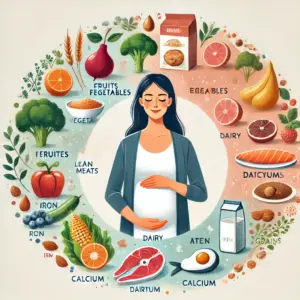Nutrition During Pregnancy

Pregnancy is a transformative time, marked by the incredible journey of growing a new life. Proper nutrition is vital during this period, not only for the health and well-being of the mother but also for the optimal growth and development of the baby. Here’s a comprehensive guide to understanding and implementing a nutritious diet during pregnancy.
The Importance of Balanced Nutrition
Balanced nutrition during pregnancy ensures that both mother and baby receive the necessary nutrients for a healthy journey. A well-rounded diet can help prevent complications, support the baby’s development, and keep the mother energized and healthy.
Key Nutrients and Their Sources
- Folic Acid:
- Importance: Essential for preventing neural tube defects.
- Sources: Leafy green vegetables, fortified cereals, citrus fruits, beans, and lentils.
- Iron:
- Importance: Crucial for the production of hemoglobin, preventing anemia.
- Sources: Lean meats, spinach, beans, fortified cereals, and dried fruits.
- Calcium:
- Importance: Needed for the development of strong bones and teeth in the baby.
- Sources: Dairy products, fortified plant-based milks, leafy greens, and almonds.
- Vitamin D:
- Importance: Helps with calcium absorption and supports immune function.
- Sources: Fatty fish, fortified milk, and exposure to sunlight.
- Protein:
- Importance: Vital for the growth of fetal tissue, including the brain.
- Sources: Lean meats, poultry, fish, eggs, beans, tofu, and nuts.
- Omega-3 Fatty Acids:
- Importance: Crucial for brain development and eye health.
- Sources: Fatty fish (like salmon), flaxseeds, chia seeds, and walnuts.
- Fiber:
- Importance: Helps prevent constipation, a common issue during pregnancy.
- Sources: Whole grains, fruits, vegetables, and legumes.
- Hydration:
- Importance: Necessary for maintaining amniotic fluid levels and overall health.
- Sources: Water, herbal teas, and water-rich fruits and vegetables.
Healthy Eating Tips for Pregnant Women
- Frequent Small Meals: Eating smaller, more frequent meals can help manage nausea and keep energy levels steady.
- Include a Variety of Foods: Ensure a diverse intake of fruits, vegetables, proteins, and whole grains to cover all nutrient bases.
- Limit Processed Foods: Minimize consumption of processed foods high in sugar, salt, and unhealthy fats.
- Safe Food Practices: Avoid foods that pose a risk of foodborne illnesses, such as unpasteurized dairy, undercooked meats, and certain fish high in mercury.
Foods to Avoid
- Raw or Undercooked Meat: To prevent exposure to harmful bacteria and parasites.
- Certain Fish: High-mercury fish like shark, swordfish, and king mackerel should be avoided.
- Unpasteurized Products: These can contain harmful bacteria.
- Caffeine: Limit intake to reduce the risk of preterm birth and low birth weight.
- Alcohol: No amount of alcohol is considered safe during pregnancy.

Sample Meal Plan for a Day
Breakfast:
- Greek yogurt topped with fresh berries and a sprinkle of chia seeds.
- A slice of whole-grain toast with avocado.
Mid-Morning Snack:
- An apple with a handful of almonds.
Lunch:
- Grilled chicken salad with mixed greens, cherry tomatoes, cucumber, and a vinaigrette dressing.
- A side of quinoa.
Afternoon Snack:
- Carrot sticks with hummus.
Dinner:
- Baked salmon with a side of steamed broccoli and sweet potatoes.
- A mixed green salad.
Evening Snack:
- A banana with a small glass of milk.
Conclusion
Proper nutrition during pregnancy is crucial for the health of both the mother and the baby. By focusing on a balanced diet rich in essential nutrients, expectant mothers can support their own health and provide the best possible start for their baby. Remember, every pregnancy is unique, so it’s always best to consult with a healthcare provider to tailor a diet plan that meets individual needs.
